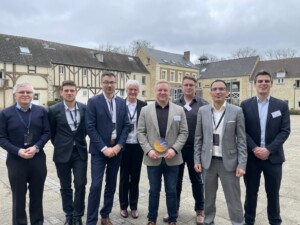Circular economy approaches for industrial SMEs
Industrial waste streams of SMEs have to be treated more effectively to close material cycles. Currently, the use of recycled material in the processing industries is very low. In Germany, for example, the share of recycled material used in production is approximately 14% across sectors, while 86% is the primary material. This originates to a significant part from a lack of information creation and flows in the markets. Current location and composition of supply and recycling are neither traced nor tracked, leading to market failure. At the same time, small and medium processing companies have major difficulties in participating the recycling markets as they often produce a high diversity of smaller sums of potential recycled material so that in sum high amounts of valuable material is lost.
Contrasting to the great environmental and economic potential of circular business models, materials recovery and recycling for the target group of industrial SMEs is still characterised by insufficient awareness and motivation to tackle these potentials. The same holds for the promises of digital solutions in the context of Industry 4.0, which are often unknown and underemployed. Hence information, activation and education are key to mobilise this target group and set the agenda for internal resource efficiency journeys and related change processes.
Circular business models offer the opportunity to reduce the resource consumption of B2B products and services but are still insufficiently exploited. Industry 4.0 applications like sensing, material and product tagging and digital logistics will be key enablers, but so far SMEs often lack access to relevant knowledge. The CycleSME project has addressed these opportunities through dedicated training workshops with SMEs.
The project partners Wuppertal Institute, Delft University of Technology and VTT aimed at conducting three training workshops with the overall target of activating 60 professionals from the industrial SME as well as their environment of stakeholders, partners, etc. By mid-December 2019, the project partners have conducted seven workshops with a total of 81 professionals trained.
Promoting digitally enhanced circular business models for SMEs
SMEs are often very lean concerning their organisation, with few people being able to address problems not linked to immediate value creation processes in the company. Slack for discovering and exploiting new markets often does not exist. Thus, company owners and decision-makers need support in acquiring knowledge and finding approaches to create and utilise valuable recycled material instead of turning it to waste.
The CycleSME project provides training and mentoring for SMEs from the production in using digital applications like apps to improve their chances of participating in the recycling markets or to establish resource-efficient circular business models. SMEs from industry will be enabled to validate, sort and market their production waste in a form that valuable recycled material is retained, so that they may sell them on the market instead of paying for disposal.
CycleSME project consortium:
- Wuppertal Institute, Germany (Lead partner)
- bvse Associations Sekundärrohstoffe und Entsorgung e.V., Germany
- Clover Sustainability Services GmbH, Germany
- Delft University of Technology, the Netherlands
- Technical Research Centre of Finland Ltd. VTT, Finland




